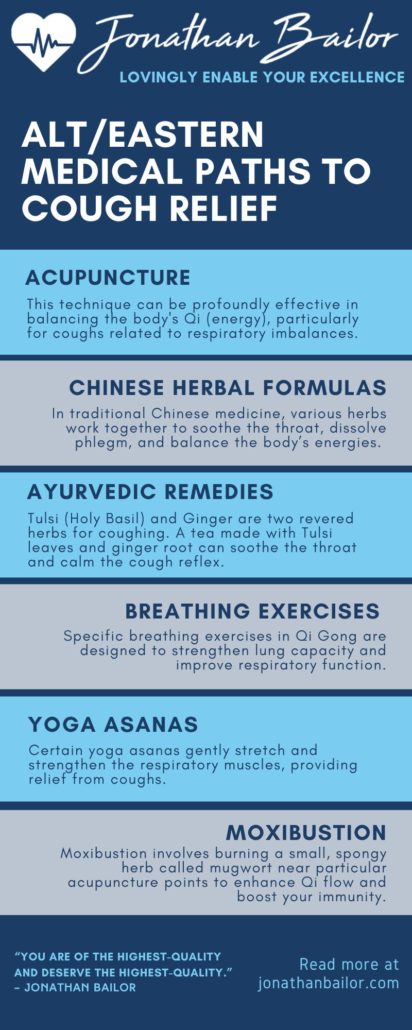23 Breathing and Other Techniques for Easing Coughing Fits
Dive into 23 breathing and other techniques for easing coughing fits. There’s something undeniably personal about a cough. Having a coughing fit can be a fleeting annoyance, a disruptive force in our daily lives, or, for some, a persistent companion that challenges our sense of well-being. But fear not—in this cough and phlegm guide with Jonathan Bailor, you’ll learn highly effective breathing and other techniques for soothing coughing fits!
Read all about cough and phlegm more in our 21 Breathing Techniques to Soothe Coughing Fits at Every Stage of Life and Solving the Mystery of Phlegm After Eating: 10 Causes and Easy Solutions guides.
In this exploration, we delve into the realm of breath—our most fundamental and life-sustaining rhythm. Breath, in its quiet power, holds secrets to calming the storm of coughing fits that can be both physically exhausting and emotionally taxing. Think of it as unlocking a gentle yet powerful toolkit hidden within the simple act of breathing.
Picture this: you’re amidst a serene setting, maybe your cozy living room or a peaceful park bench, harnessing the power of your breath to soothe the irritation in your throat. Imagine the relief, the sense of control, as you learn techniques that transform each inhale and exhale into a calming balm for your cough.
We often overlook the simplest solutions, don’t we? Amidst our search for complex answers, we sometimes forget the profound impact of the basics. Breath is our constant companion, yet we seldom tap into its full potential for healing and comfort. This exploration isn’t about complex medical jargon or unreachable remedies; it’s about accessible, evidence-based techniques that resonate with the rhythm of our daily lives.
As you read on, envision yourself sharing these insights with friends and family. Imagine their appreciation as you offer them not just information but a path to greater comfort and well-being. This isn’t just about reading an article; it’s about embracing a shared journey toward harnessing our innate capacity for self-healing.
The techniques we’ll explore are more than mere steps or procedures. They are invitations to a deeper understanding of our bodies, empowerment in the face of discomfort, and a testament to the gentle power of our breath. Let’s embark on this journey together, transforming the way we respond to the call of a cough and rediscovering the serene power of our breath.
Embracing Allopathic Wisdom: Western Medicine Approaches to Soothe Coughing Fits
1. Inhalers for Immediate Relief
When a cough tightens its grip, inhalers emerge as a beacon of immediate relief. These handy devices, often containing bronchodilators, swiftly open the airways, easing the breath’s journey in and out of the lungs. They’re particularly effective for those with asthma or chronic obstructive pulmonary disease (COPD), transforming a moment of struggle into one of relief. Think of it as having a quick-acting ally in your pocket, ready to restore your comfort at a moment’s notice.
2. Antitussives for Suppressing the Cough Reflex
Imagine having the power to gently hush your cough reflex, bringing tranquility to your throat. Antitussives, commonly known as cough suppressants, offer this very solution. They work at the level of the brain, subtly calming the cough reflex, making them ideal for dry, unproductive coughs that linger without bringing any relief. Cough drops are common antitussives. With these, your nights can be quieter and your days more serene.
3. Expectorants to Ease Congestion
Battling a chest filled with mucus can be both exhausting and discomforting. Expectorants come to the rescue by thinning the mucus, making it easier to cough up and clear the airways. This approach shifts the balance, transforming a laborious cough into a more productive and less taxing one. It’s about giving your body a helping hand to restore its natural rhythm and ease.
4. Decongestants to Clear Nasal Passages
A congested nose often plays a hidden role in aggravating coughs. Decongestants are like a breath of fresh air, working to shrink swollen nasal passages and reduce the postnasal drip that can trigger coughing. They’re the unsung heroes that address the root of the issue, not just the symptom, paving the way for a smoother, more comfortable breathing experience.
5. Cough Medications with Pain Relievers
For those times when a cough brings along discomfort or even pain, there are cough medications blended with pain relievers. These combinations work in tandem, easing the cough while also alleviating the soreness that can accompany persistent coughing. It’s like having a dual-action formula at your disposal, tackling both the cause and the accompanying discomfort head-on.
6. Antibiotics for Bacterial Infections
When a cough is rooted in a bacterial infection, antibiotics step in as a targeted solution. They work by attacking the bacteria, thereby addressing the underlying cause of the cough. It’s important to remember that antibiotics are specific to bacterial infections and are not a one-size-fits-all solution. In their targeted approach, they embody the precision and effectiveness of modern medicine.
7. Acid Reflux Medications for Associated Coughs
Sometimes, a cough is a ripple effect of acid reflux. In such cases, medications designed to reduce stomach acid can be surprisingly effective in calming the cough. By addressing acid reflux, these medications indirectly soothe the throat and reduce coughing episodes. It’s about looking beyond the obvious and treating the source, not just the symptom.
Each of these approaches, grounded in the foundations of Western medicine, offers a unique pathway to relief. They remind us of the advancements in medical science, bringing solutions that are both effective and rooted in a deep understanding of the human body. As we navigate the challenges of a persistent cough, these allopathic solutions stand as testaments to the progress and potential of modern healthcare.

Feeling Better Is Priceless, That's Why We Don't Put A Price On It!
“It’s Like A Free and Medically Valid Version of Noom and Weight Watchers Online”
~ Dr. Doctor Matthew Oleshiak, MD
Click the 'LEARN MORE' button below for free lifetime access to the fast fix program developed by Jonathan and top Ivy League Medical Doctors
LEARN MOREP.S. It's not a free trial. It's not part of the program for free. The entire program is free, forever, for real! No credit card needed.
Harnessing Nature’s Healing: Naturopathic Approaches to Easing Coughs
1. Honey and Lemon Syrup
Picture the soothing embrace of honey and the zest of lemon coming together in a natural syrup. This simple yet powerful concoction is a testament to nature’s healing touch. Honey, with its natural antibacterial properties, coats and soothes the throat, while lemon adds a dose of vitamin C and a refreshing tang. This remedy not only calms the cough and soothes a sore throat but also brings a moment of sweetness to your day.
2. Peppermint Steam Inhalation
Imagine the invigorating scent of peppermint filling your senses as you inhale deeply. Peppermint steam inhalation is a gentle yet effective way to ease coughing. It’s especially effective for those suffering from nighttime coughing. The natural menthol in peppermint works as a mild decongestant, helping to break down mucus and open the airways. This method combines the purity of warm steam with the refreshing essence of peppermint, creating a soothing experience for both your throat and your senses.
3. Slippery Elm Lozenges
Slippery elm, with its unique mucilaginous properties, forms a soothing film over the mucous membranes, relieving the irritation that drives coughing. These lozenges are a convenient and effective way to harness the soothing power of slippery elm, offering relief that’s both gentle and natural. Keep them on hand for those moments when your throat seeks a soothing touch.
4. Licorice Root Tea
Licorice root tea is not just a beverage; it’s a soothing elixir for your throat. Its natural anti-inflammatory and expectorant properties make it a valuable ally in the fight against coughs. As you sip on this sweet, earthy tea, envision the active compounds in licorice root gently calming your cough, offering a natural and comforting remedy.
5. Eucalyptus Essential Oil Diffusion
Envision the crisp, refreshing scent of eucalyptus filling your space, creating an atmosphere of healing. Using eucalyptus essential oil in a diffuser can help to clear the airways and ease coughing. Its natural components work to reduce inflammation and provide a sense of respiratory ease, making each breath a step toward relief.
These naturopathic solutions, rooted in the wisdom of nature, offer a harmonious balance between effectiveness and gentleness. They remind us of the profound healing power inherent in the natural world, providing comfort and relief in a way that aligns with the body’s innate rhythms. As we explore these remedies, we embrace a holistic approach to health, celebrating the simplicity and potency of nature’s medicine cabinet.

Osteopathic Insights: Gentle Interventions for Cough Relief
1. Osteopathic Manipulative Treatment (OMT) for Respiratory Relief
Imagine a therapy where gentle, skilled hands work to enhance your body’s natural healing processes. OMT for respiratory relief focuses on releasing muscle tension around the chest and improving lymphatic drainage. This technique can be particularly beneficial for those suffering from coughs associated with respiratory conditions, as it aims to improve lung mechanics and aid in easier breathing. It’s about aligning the body’s structure with its function, allowing for a smoother respiratory process.
2. Diaphragmatic Breathing Exercises
Diaphragmatic breathing is not just about taking deep breaths; it’s a deliberate practice that enhances lung capacity and improves oxygen exchange. By focusing on engaging the diaphragm rather than the chest muscles during breathing, this exercise can help alleviate the strain of coughing. It encourages a more efficient breathing pattern, which can be especially beneficial for those with chronic coughs, bringing a sense of ease and control over their breathing.
3. Soft Tissue Techniques for Chest and Back
Osteopathic soft tissue techniques involve gentle manipulation of the muscles and connective tissues in the chest and back. This approach can help relieve tension, improve blood circulation, and enhance lymphatic drainage in these areas. It’s about creating a harmonious environment in the body that supports respiratory health and eases the discomfort of coughing.
4. Cranial Osteopathy to Balance Nervous System
Cranial osteopathy is a subtle yet profound approach that involves gentle manipulation of the skull bones to balance the nervous system. This technique can be particularly soothing for those whose cough is exacerbated by stress or tension. Targeting the body’s cranial rhythm promotes relaxation and a sense of balance, offering an indirect yet effective way to manage coughing.
5. Guided Stretching and Movement Therapy
Incorporating guided stretching and movement into your routine can significantly benefit your respiratory health. This osteopathic approach focuses on enhancing mobility, especially in the torso, to improve breathing mechanics and alleviate coughing. It’s about empowering you with movements that relieve symptoms and contribute to overall respiratory wellness.
These osteopathic solutions offer a unique perspective on managing coughs, focusing on the body’s holistic balance and innate capacity for self-regulation. By addressing structural imbalances and enhancing the body’s natural functions, osteopathy provides a gentle yet effective pathway to respiratory health and comfort.

Eastern Wisdom: Alternative and Eastern Medicine Approaches to Cough Relief
1. Acupuncture for Respiratory Balance
Envision the ancient practice of acupuncture, where fine needles gently tap into the body’s energy pathways. This technique can be profoundly effective in balancing the body’s Qi (energy), particularly for coughs related to respiratory imbalances. Acupuncture points pertaining to the lungs and airways are targeted to harmonize the flow of energy and alleviate the persistent urge to cough, offering a sense of deep, holistic relief.
2. Herbal Formulations in Traditional Chinese Medicine (TCM)
In the realm of TCM, herbal formulations are tailored to address the unique imbalances causing a cough. A blend of herbs such as Platycodon, Licorice Root, and Apricot Seed is often prescribed based on an individual diagnosis. These herbs work synergistically to soothe the throat, dissolve phlegm, and balance the body’s energies, reflecting the intricate wisdom of TCM in every sip of the herbal concoction.
3. Ayurvedic Remedies with Tulsi and Ginger
Ayurveda, the ancient Indian system of medicine, offers a treasure trove of remedies for coughs. Tulsi (Holy Basil) and Ginger are revered herbs in this tradition. A tea made with Tulsi leaves and ginger root can be immensely soothing for the throat, boosting immunity and calming the cough reflex. This approach combines the warmth of ginger with the healing properties of Tulsi, creating a nurturing embrace for the respiratory system.
4. Qi Gong Breathing Exercises
Qi Gong, a practice rooted in Chinese medicine, emphasizes the harmonious flow of energy throughout the body. Specific breathing exercises in Qi Gong are designed to strengthen lung capacity and improve respiratory function. Engaging in these exercises is like embarking on a meditative journey, where each breath enhances lung health and gradually diminishes the intensity of coughs, embodying the tranquility and balance of Eastern practices.
5. Yoga Asanas for Chest Opening
Yoga, more than just physical postures, is a journey towards inner balance and health. Certain asanas (poses) like Bhujangasana (Cobra Pose) and Setu Bandhasana (Bridge Pose) are particularly beneficial for opening the chest and enhancing lung capacity. These asanas gently stretch and strengthen the respiratory muscles, relieving coughs and promoting a sense of expansive, free breathing.
6. Moxibustion for Warming and Healing
Moxibustion involves burning a small, spongy herb called mugwort near particular acupuncture points. This technique is used to warm and stimulate these points, enhancing Qi flow and boosting immunity. For those suffering from cold-related coughs, as often occurs with an upper respiratory infection, moxibustion offers a warming, energizing treatment, subtly yet effectively reducing the frequency and intensity of coughs.
These alternative and Eastern medicine approaches provide a window into a world where healing is interwoven with the rhythms of nature and the wisdom of ancient practices. They offer not just relief from symptoms but a holistic pathway to wellness, resonating with the body’s natural capacity for balance and healing.

Understanding Coughing & Phlegm: Your Questions Answered
Q1: What causes a cough to become chronic?
A chronic cough, persisting for weeks or even months, can often feel like a mystery. It’s usually a symptom of an underlying condition, such as asthma, pneumonia, viral infections, gastroesophageal reflux disease (GERD), or chronic bronchitis. Sometimes, environmental factors like allergens or persistent exposure to irritants like smoke can also contribute to persistent coughing fits. It’s important to consult a healthcare professional to identify the root cause, as the nature of a chronic cough can vary greatly among individuals and may require individualized medical treatments.
Q2: Why do we produce phlegm when we cough, and what does its color indicate?
Phlegm is a natural part of our body’s defense mechanism, produced by the respiratory system to trap irritants and microbes. Its presence during a cough helps clear these from the airways. The color of phlegm can be a clue to your health: clear phlegm is normal, yellow or green might suggest an infection, and brown or red could indicate more serious conditions like bronchitis or even blood. However, color alone isn’t a definitive diagnosis and should be evaluated in the context of other symptoms.
Q3: Are cough suppressants always advisable for treating a cough?
Cough suppressants, or antitussives, can relieve the discomfort of continuous coughing, but they’re not always the ideal solution. They work best for dry, unproductive coughs that don’t involve phlegm. In cases where a cough is productive, meaning it brings up phlegm, suppressing it might not be beneficial as the body needs to expel these secretions. Understanding the nature of your cough is key to deciding whether a cough suppressant is appropriate.
Q4: Can lifestyle changes impact the frequency or severity of coughing?
Absolutely, lifestyle factors play a significant role in managing coughs. For instance, smoking cessation can significantly reduce coughing and improve symptoms. It can also support lung health. Staying hydrated helps thin mucus, making it easier to expel. For those with a cough aggravated by GERD, dietary changes to avoid trigger foods and eating smaller, more frequent meals can be beneficial. Ensuring a dust-free environment and using air purifiers can also help, especially for allergy-induced coughs.
Q5: When should one seek medical attention for a cough?
While most coughs are not a cause for alarm, certain signs warrant medical attention. If a cough persists for over three weeks and is accompanied by symptoms like shortness of breath, chest pain, or bloody phlegm, it’s time to consult a healthcare professional. Uncontrollable coughing can be a sign of an underlying condition, such as whooping cough, respiratory tract infection, gastroesophageal reflux disease (GERD), or even lung cancer. Additionally, a high fever, difficulty breathing, or a cough that significantly disrupts sleep or daily activities are also signs that a doctor’s evaluation is necessary.
Understanding the intricacies of coughing and phlegm is crucial to addressing the discomfort they bring. Always consider the broader context of your symptoms and seek medical advice when in doubt, as a cough can be a messenger of deeper health issues.

Embracing Health: A Journey Through Cough Relief
As we conclude our exploration of the diverse world of cough remedies, from the wisdom of Western medicine to the harmonious approaches of Eastern practices, remember that each breath is a step towards wellness. These insights, spanning various traditions and practices, are more than just solutions; they are invitations to deeper understanding and self-care. If this journey has illuminated your path to respiratory health, consider sharing these revelations with friends and family. Let’s spread this knowledge through emails and social media, fostering a community where every breath is easier, healthier, and more comfortable for all.
Feeling Better Is Priceless, That's Why We Don't Put A Price On It!
“It’s Like A Free and Medically Valid Version of Noom and Weight Watchers Online”
~ Dr. Doctor Matthew Oleshiak, MD
Click the 'LEARN MORE' button below for free lifetime access to the fast fix program developed by Jonathan and top Ivy League Medical Doctors
LEARN MOREP.S. It's not a free trial. It's not part of the program for free. The entire program is free, forever, for real! No credit card needed.




